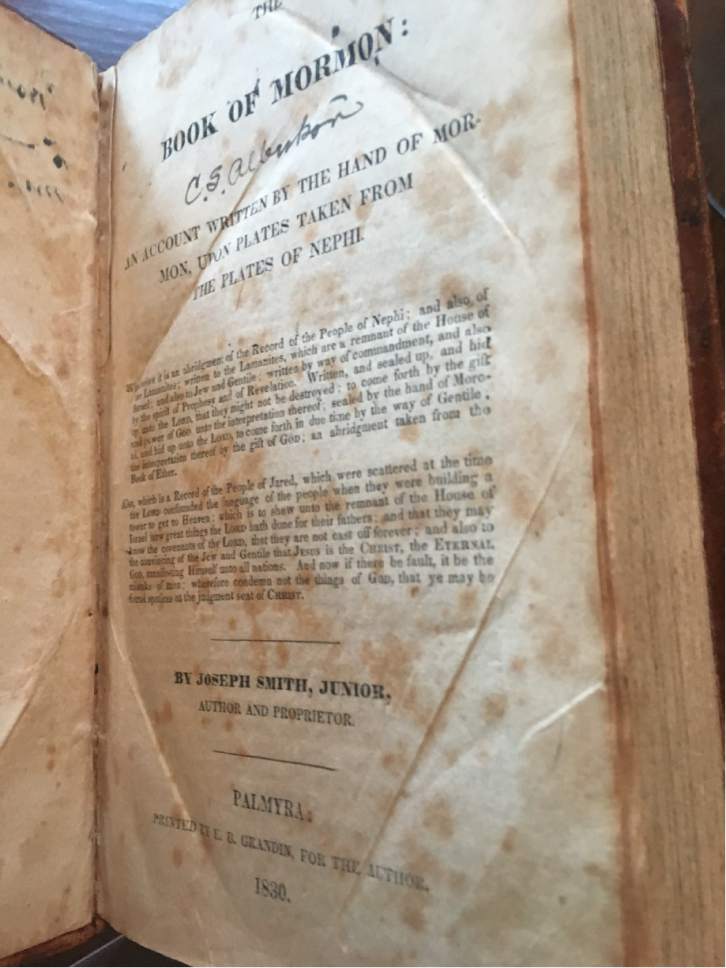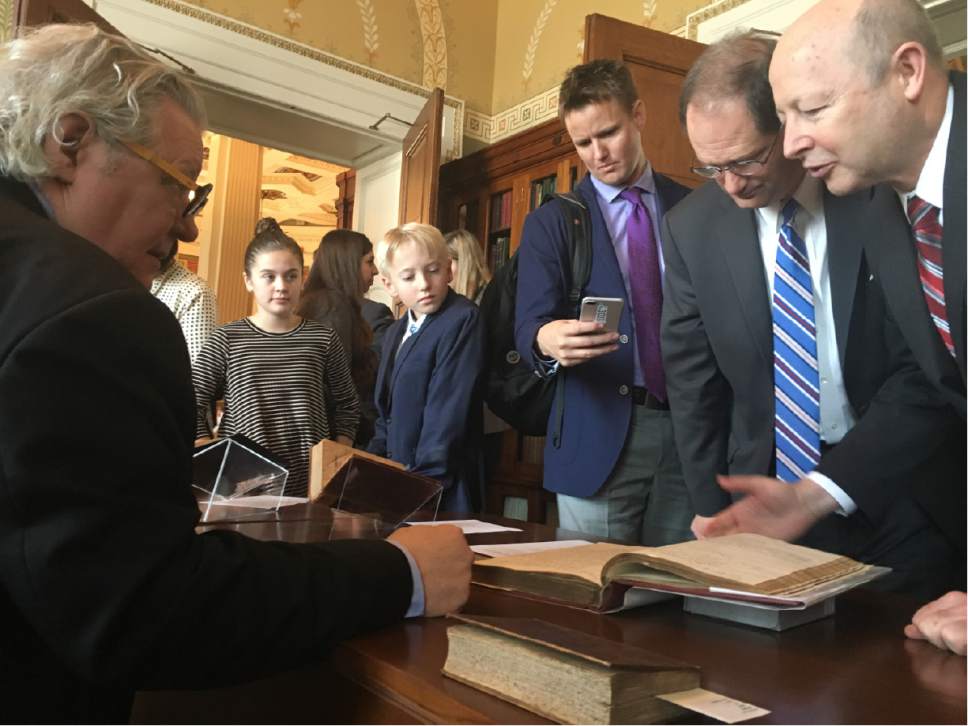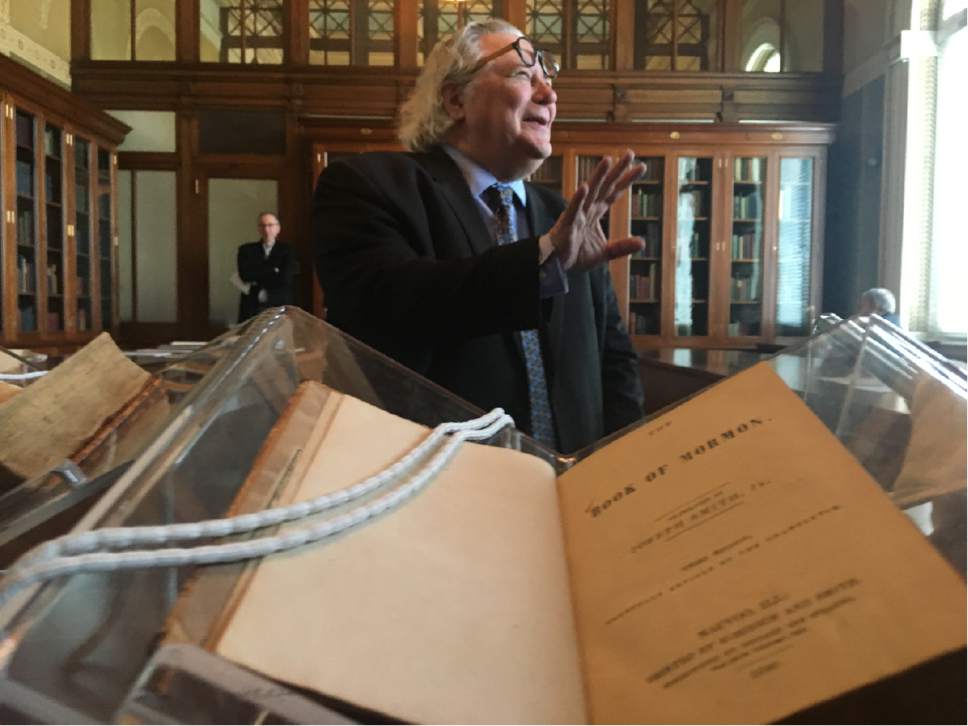This is an archived article that was published on sltrib.com in 2016, and information in the article may be outdated. It is provided only for personal research purposes and may not be reprinted.
Washington • The Book of Mormon was highlighted Wednesday as one of America's treasured tomes at the Library of Congress, which displayed several rare editions as well as the 1829 copyright record filed by church founder Joseph Smith.
Nearly every Mormon in Congress as well as high-profile members of The Church of Jesus Christ of Latter-day Saints from the Washington region pored over the first and third editions, an original Book of Commandments from the faith's founding and other rare items that are part of the Library of Congress collection.
The Book of Mormon was chosen by the public as the fourth most influential piece of American literature in an online vote earlier this year.
"It's been a book that's been extremely influential in my life. It's interesting to hear it referred to as the fourth most influential book in American literature," said Elder D. Todd Christofferson, a member of the LDS Church's Quorum of the Twelve Apostles who earlier Wednesday became the first of the faith's apostles to open a Senate session with a prayer.
"I know what its influence has been in my life," Christofferson added, "and I'm grateful that anybody else has that same experience and opportunity."
Nearly every Mormon member of Congress joined the event, including Sen. Orrin Hatch, who hosted the gathering and noted the importance of the library that includes, he said, a copy of his "faded" 1934 birth certificate.
"They're very proud of the Mormon collection they have here. It is special," Hatch, R-Utah, said Wednesday, adding that the Book of Mormon is "one of the most important books of understanding the basis of America and what it means and why this land is so precious to all of us."
The top most influential books selected by the online public vote span an eclectic range, from Ayn Rand's "The Fountainhead" to satirist Kurt Vonnegut's "Slaughterhouse-Five, to Alex Haley's "Roots: The Saga of an American Family." They are all featured in the "America Reads" collection, celebrating the public's choice of the top 40 "other books" by American authors that had a profound impact on American life (in addition to 25 vetted by experts that featured more traditional picks, such as Harper Lee's "To Kill a Mockingbird" and Mark Twain's "The Adventures of Huckleberry Finn").
Hatch noted that while the Book of Mormon may be considered part of the American literature collection, more than 15 million members worldwide believe that the book dates back to the origin of man.
Sen. Jeff Flake, an Arizona Republican and Mormon, said having the Book of Mormon as part of the group of books chosen shows the religious doctrine's influence.
"It's important, not just for the LDS community, but as an important historical note to have it here," Flake said.
Senate Chaplain Barry C. Black, a Seventh-day Adventist, opened Wednesday's event about the Book of Mormon with a prayer offering thanks that the LDS Church's most precious tome was part of the exhibit.
"We praise you that this influential book has made a transformational impact on the lives of millions," Black said, "providing them with doctrines and instructions that have enabled them to glorify your name." —
Books that shaped America
Top 40 nominations from 2016 online poll
1 • Ayn Rand (1905–1982). The Fountainhead, 1943
2 • Kurt Vonnegut (1922–2007). Slaughterhouse-Five, or The Children's Crusade: A Duty-Dance with Death, 1969
3 • Laura Ingalls Wilder (1867–1957). Little House in the Big Woods, 1932 (Little House Series)
4 • Joseph Smith, Translator(1805–1844). The Book of Mormon: Another Testament of Jesus Christ, 1830
5 • Willa Cather (1873–1947). My Ántonia, 1918
6 • Alex Haley (1921–1992). Roots, 1976
7 • Ayn Rand (1905–1982). Anthem, 1938
8 • Alice Walker (b. 1944). The Color Purple, 1982
9 • John Steinbeck (1902–1968). Of Mice and Men, 1937
10 • John Steinbeck (1902–1968). East of Eden, 1952
11 • Sylvia Plath (1932–1963). The Bell Jar, 1963
12 • Tim O'Brien (b. 1946). The Things They Carried, 1990
13 • Carl Bernstein (b. 1944) and Bob Woodward (b. 1943). All the President's Men, 1974
14 • Arthur Miller (1915–2005). Death of a Salesman, 1949
15 • Arthur Miller (1915–2005). The Crucible, 1953
16 • Ernest Hemingway (1899–1961). The Old Man and the Sea, 1952
17 • Ken Kesey (1935–2001). One Flew Over the Cuckoo's Nest, 1962
18 • Hunter S. Thompson (1937–2005). Fear and Loathing in Las Vegas, 1972
19 • Ernest Hemingway (1899–1961). The Sun Also Rises, 1926
20 • John F. Kennedy (1917–1963). Profiles in Courage, 1956
21 • Stephen King (b. 1947). The Stand, 1978
22 • Larry McMurtry (b. 1936). Lonesome Dove, 1985
23 • Judy Blume (b. 1938). Are You There God? It's Me Margaret, 1970
24 • Howard Zinn (1922–2010). A People's History of the United States, 1980
25 • James Fenimore Cooper (1789–1851). The Last of the Mohicans: A Narrative of 1757, 1826
26 • Robert A. Heinlein (1907–1988). The Moon Is a Harsh Mistress, 1966
27 • Wilson Rawls (1913–1984). Where the Red Fern Grows,1961
28 • Madeleine L'Engle (1918–2007). A Wrinkle in Time, 1962
29 • Frank Herbert (1920–1986). Dune, 1965
30 • Thomas Pynchon (b. 1937). Gravity's Rainbow, 1973
31 • Simone Beck (1904–1991), Louisette Bertholle (1905–1999), and Julia Child (1912–2004), Mastering the Art of French Cooking, 1961
32 • Kate Chopin (1850–1904). The Awakening, 1899
33 • Shel Silverstein (1930–1999). The Giving Tree, 1964
34 • Milton Friedman (1912–2006). Capitalism and Freedom,1962
35 • Milton Friedman (1912–2006) and Rose Friedman (1910–2009). Free to Choose, 1980
36 • Ralph Waldo Emerson (1803–1882). Nature, 1836
37 • Napoleon Hill (1883–1970). Think and Grow Rich, 1937
38 • John Kennedy Toole (1937–1969). A Confederacy of Dunces, 1980
39 • Robert Penn Warren (1905–1989). All the King's Men, 1946
40 • Robert Pirsig (b. 1928). Zen and the Art of Motorcycle Maintenance, 1974
Source: Library of Congress online poll (in addition to a list of 25 vetted by experts that includes more traditional choices such as Mark Twain's The Adventures of Huckleberry Finn and Harper Lee's To Kill a Mockingbird.)







